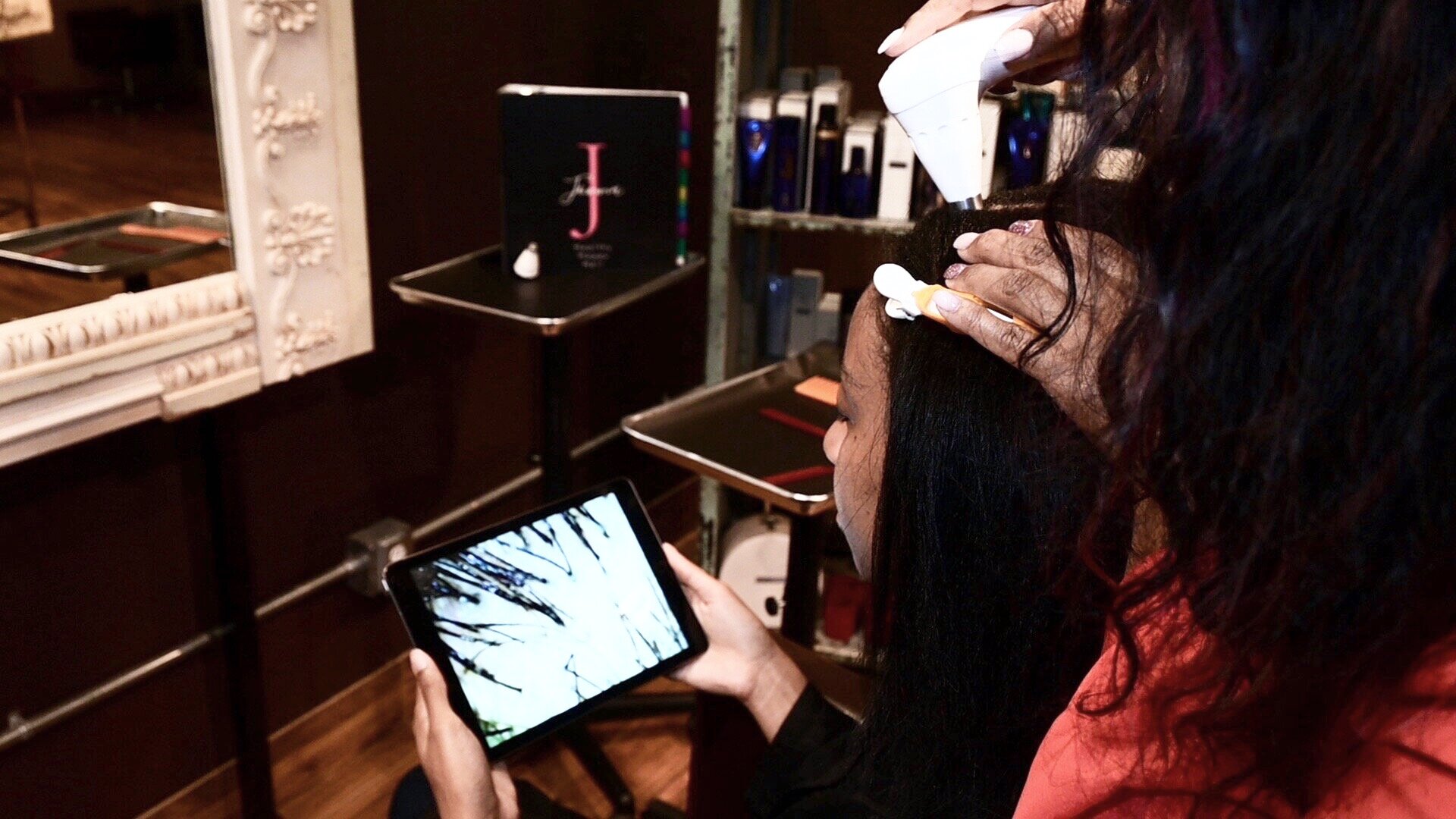
Trichology and Scalp Therapy
What is a Trichologist?
Trichologists are specialists in the science of the structure, function and diseases of the human hair and the scalp. Trichology is the para-medical science of the hair, hair loss and associated scalp problems and is perceived as the “bridge between cosmetology and dermatology.
Why is Trichology important to Cosmetology?
Cosmetology is the study and application of beauty treatments and hair styling. Trichologist deal with all aspects of the hair and scalp. From providing expert diagnosis on serious hair diseases to advising proper hair and scalp maintenance techniques, products and or tools. Cosmetologists who are certified in Trichology can help you to catch your hair loss in the early stages, possibly slowing down the hair loss and begin restoring hair growth.
What is Alopecia?
Alopecia is the medical term for hair loss. Hair loss (Alopecia) can affect just your scalp or your entire body, and it can be temporary or permanent. There can be a variety of causes such as heredity, hormonal changes, medical conditions, stress, or a normal part of aging.
There are many different variations of alopecia such as:
Androgenetic Alopecia
Traction Alopecia
Telogen Effluvium
Alopecia Areata
Scarring Alopecia
Hair Loss due to Chemotherapy or other health related conditions
Some scalp conditions and disorders that can lead to hair loss are: Seborrheic Dermatitis, Psoriasis, and Dry-Itchy-Inflamed Scalp. If you are experiencing any of these symptoms click here to book your free 15-minute phone consultation.
How do we treat these conditions and disorders?
Step 1: Consultation 60 minutes
Every single appointment begins with an in-depth consultation. Prior to this appointment I will send you a questionnaire asking you about your medical history, nutrition, diet, genetics, hair care practices, and lifestyle. This will help identify the type of hair loss and scalp conditions you are dealing with. Some scalp conditions require you to see a medical doctor if it is not within the scope of my trichology practice. Lab test are not required for your initial consultations, depending on our conversation I may request these results in order to get a better understanding of what is triggering the hair loss.
Step 2: Discovery
During this time, we will look at your hair and scalp with a tricho-analyzer. Here we are looking for density, size and color variations of the hair, as well as the condition of the scalp.
Step 3: Treatment Recommendations
After we have identified the type of hair loss and scalp disorder, I can now create a customized treatment, and hair care regime. Treatment for hair loss is based on the individual and there is no guarantee that a specific treatment will regrow hair. The regrowth of hair depends on the type of hair loss you have, and all of the factors that triggered the condition. In many cases hair can regrow as long as there is a presence of hair follicles.
You may decide to begin treatment that day or you may purchase products to take home. It is recommended that your first treatment is done in clinic.
Some of the ways we treat hair loss include: Weekly Scalp Treatments (In-Clinic or At Home), Nutritional Supplements, and Low Level Light Therapy (LLLT)
What is LLLT?
Low Level Light Therapy (LLLT) is form of medicine that applies low level lasers or light emitting diodes to the surface of the body. LLLT improves blood circulation up to 54% with just one treatment and is incredibly effective at treating the thinner, weaker hair follicles. It has been shown to help make hair grow thicker, stronger, and healthier. Improving hairs appearance and volume. Low level light therapy does not work in cases where baldness has existed for years. It cannot cause hair growth on areas of the scalp where follicles have already diminished.
What is Cranial Prosthesis?
A hair prosthesis (cranial prosthesis) is a custom-made wig specifically designed for patients who have lost their hair as a result of medical conditions such as alopecia areata, alopecia totalis, universalis, trichotillomania, chemotherapy, or any other clinical disease or treatment resulting in hair loss.
Most Insurance companies will cover between 80-100% of the cost for your full cranial prosthesis and will allow you to receive one unit per year for medical hair loss. Depending on the insurance your prosthesis may also be a tax-deductible expense.
“That detox water!!!! no shampoo or conditioner used and my hair is soooooo soft!!”
“It’s in the water!!!!! Go get your hair detox feel the vibes of the shop. Come out feeling like a million bucks!!!!”
“Since you have been using the new water system, my hair has never felt better, been easier to comb through, and “fly” (and I really mean that...it moves all the time!) I’m loving my hair!”
“I feel like a celebrity!! My hair feels and looks fabulous. ..it bounces when I walk! Lol... ”





